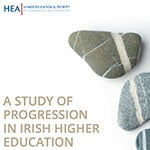 In the fourth of a series, a new HEA report A Study of Progression in Irish Higher Education published in early January this year, focuses on the progression of students from their first year of study in 2012/13 to their second year of study in 2013/14.
In the fourth of a series, a new HEA report A Study of Progression in Irish Higher Education published in early January this year, focuses on the progression of students from their first year of study in 2012/13 to their second year of study in 2013/14.
The report shows that 84% of full-time undergraduate new entrants in 2012/13 progressed to their second year of study in 2013/14 – 16% did not progress. This compares favourably internationally and it is also noteworthy that that this proportion has remained stable since 2007/08. Overall, this is testament to the resilience of a sector which has accommodated rising student numbers while staff numbers and budgets have been cut substantially. However, the fact remains that over 6,000 students did not progress.
Progression rates varied across the sector ranging from 26% and 28% at level 6 and 7 respectively compared to 11%, 17% and 6% at level 8 in universities, institutes of technology and colleges respectively.
Of particular concern are the above average non-progression rates in the fields of Construction and Related, Services, Computer Science and Engineering. Computer Science has the highest rate of non-progression at level 8 but this varies greatly between universities (15%) and institutes of technology (26%) as well as between institutions.
As was the case in previous reports, females have higher rates of progression than males across all levels and sectors.
The report confirms that there is a significant relationship between prior educational attainment (based on Leaving Certificate points) and progression rates. While the overall non-progression rate is 16%, this rises to 34% for students who obtained between 255 and 300 points. Only 7% of students who obtained between 555 and 600 points did not progress to the following year of study.
Mr Tom Boland, CEO of the HEA commented that ‘While the figures are stable over time and comparable with competitor countries, they are a source of concern. Further research into the issues surrounding student retention is necessary so that by understanding the causes we can deal with them. Issues of particular interest include the connection between academic preparedness of students and student engagement with college. The impact and effectiveness of career guidance also merits attention as do the personal issues and experiences of students that contribute to drop out. National policy already requires that a whole post second level approach is necessary, with a strong focus on the transition from school to college; more information to students and parents on the options available in further education as well as clear pathways from further to higher education’.
The full HEA report can be viewed at http://www.hea.ie/sites/default/files/hea-progression-irish-higher-education_final.pdf.